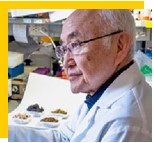NFCR Translational Research: Colorectal Cancer
New Treatment for Colorectal Cancer Patients in Phase I Clinical Trial

Ronald A. DePinho, M.D. Univ. of Texas MD Anderson Cancer Center, Houston, Texas
STAT3 is a major signaling protein in cells. Hyperactivation of STAT3 occurs in over 50% of cancers, including colorectal cancer, and results in abnormal cell growth, escape from our immune system, metastasis (spreading), and other cancer-associated processes. The development of drugs to target STAT3 effectively has been a challenge for the research community, earning it the label of ‘undruggable’.
However, Ronald DePinho, M.D. and his colleagues used computer-based drug screening of hundreds of thousands of compounds to identify several candidates that inhibit STAT3 protein when tested in complex tumor models of colorectal cancer and other various cancers.
NFCR support facilitated the final studies of the most promising inhibitor of STAT3. The new treatment is treating patients in an ongoing Phase I clinical trial to establish its safety and appropriate dose. Patients with advanced colorectal cancer and other advanced cancers may be eligible to enroll in the trial of this new treatment.
Development of Botanical Drug with Multiple Anti-Cancer Properties: Potential to Improve Survival and Quality of Life

Yung-Chi Cheng, Ph.D. Yale University, New Haven, CT
Dr. Yung-chi Cheng and his team developed a four-herb formulation into YIV-906, a botanical drug with multiple anti-cancer properties that also enhance immunotherapy and chemotherapy. In previous early-stage Phase I/II clinical trials for colorectal, liver, and pancreatic cancers, YIV-906 demonstrated safety and promising efficacy, with the potential to improve survival and quality of life for patients
NFCR’s continued funding helped Dr. Cheng develop his lab’s exclusive botanical drug quality control and monitoring platform.
Since 2020, a global Phase II clinical trial is treating liver cancer patients with YIV-906 combined with a frontline drug. Since YIV-906 also protects the gastrointestinal tract from harsh side effects of many therapies, the botanical should alleviate adverse effects of the frontline drug. With success in final clinical trials, YIV-906 could become the first U.S.-approved botanical cancer drug. This would facilitate future trials of YIV-906 therapy for colorectal cancer.
Molecular Imaging Detects Cancer-free Margins During Surgery

James P. Basilion, Ph.D. Case Western Reserve Univ. Cleveland, OH
The best chance of a cure for many early-stage cancers is complete, surgical resection. A challenge for surgeons is determining where cancer ends, and healthy tissue begins – known as ‘cancer margins’. Immediate margin detection can benefit many patients who otherwise must return for a second surgery after pathology lab results of surgery samples determine margins were not cancer-free. With NFCR funding since 2005, Dr. James Basilion developed molecular imaging light-emitting probes to bind only cancer cells. Surgeons quickly apply the probe and a camera visualizes any remaining cancer cells to be resected or the margins of the surgery are ‘cancer-free’.
Dr. Basilion is translating the molecular imaging probes into the clinics. With NFCR funding, the probe is being optimized in pre-clinical studies for detection of margins in breast cancer lumpectomies. After approval of the Initial New Drug (IND) from the FDA, the probe will enter Phase I clinical trials to improve cure rates for breast cancer. Light-emitting probes are under development for colon cancer. Successful initial clinical trials of the probe for breast cancer will facilitate a future trial to benefit colon cancer patients.
Novel Antibodies for a New Treatment for Colorectal Cancer

Daniel D. Von Hoff, M.D., FACP Translational Genomics Research Institute, Phoenix, AZ
Dr. Daniel Von Hoff, a pioneer and world leading physician-scientist in translational medicine, has personally been involved in over 200 clinical trials. In 1985, began his continuous support from NFCR that led to gemcitabine, the first approved treatment for pancreatic cancer.
A new current focus is developing monoclonal antibodies to treat metastatic (spreading) colon cancer that is refractory to other standard treatments. A novel antibody targets a key protein on colon cancer cells involved in cancer spread and progression. Promising results have been demonstrated in colon cancer models.
The specific monoclonal antibody technology is moving into the pre-clinical stage to bring the antibodies to the stage of clinical development and ultimately to patients.
NFCR funds are facilitating the required pre-clinical studies to translate the antibody into clinical development as a new treatment for metastatic colon cancer that no longer responds to standard therapy.
BASIC RESEARCH PROJECTS
Dr. Paul Schimmel and Dr. Xiang-Lei Yang, experts in the protein synthesizing enzymes Aminoacyl-tRNA synthetases (aaRS), also study the enzyme’s other unexpected roles. One aaRS, SerRS, thwarts cancer’s growth and may activate the immune system. SerRS may also be a suppressor of metastasis as enzyme levels are significantly decreased in rectal cancer tissue during metastasis. Their research may lead to a novel way to treat rectal cancer.
Dr. Paul Fisher engineered IL/24 gene to cause cancer cells — at all sites in the body — to commit suicide (normal way cells die). Healthy cells are unaffected by IL/24 gene’s effects. IL/24 gene modulates the immune system to kill cancer, inhibits blood vessel formation to tumors to starve them of vital blood supply, and sensitizes cancer to radiation, chemotherapy and immunotherapy. While his therapy is advancing to first treat brain cancer, glioblastoma or GBM, IL/24 gene therapy is effective in models of many types of metastatic cancer including colorectal cancer.










